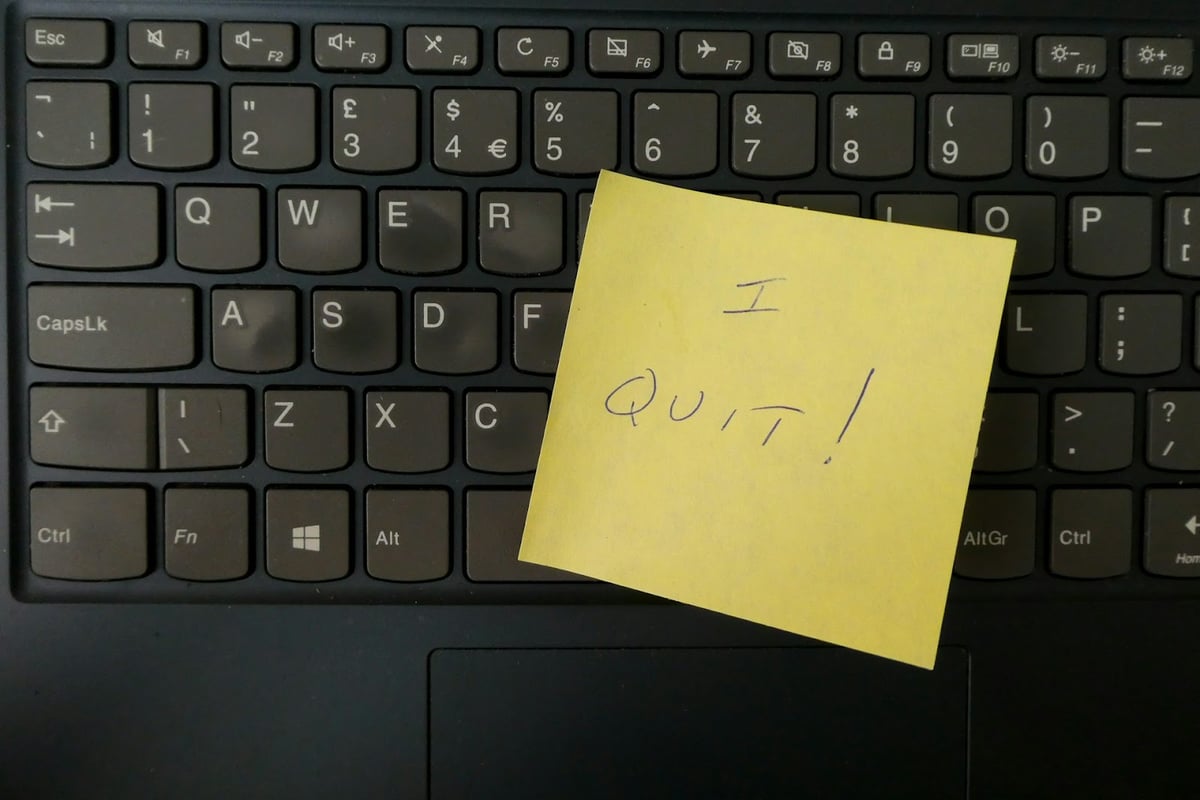Miserable at work? When it comes to figuring out how to leave your job for better opportunities or simply moving away from a role or company that just isn't working out, you've got two options:
- Quit now on your own terms
- Stick it out and possibly get fired
I know, neither sounds particularly appealing, and the decision is anything but simple. Both have significant implications for your career, finances, and mental health.
One route may ultimately be better for your situation, so let's dive in and figure out which path makes the most sense for you.
What's the difference between quitting and getting fired?
Let's get on the same page about what we're discussing:
Quitting means you actively choose to resign from your position. You assess the situation and determine that leaving on your own terms is the wisest path forward. This puts the ball in your court—though it requires a strategy to preserve professional relationships and your reputation.
Getting fired (or "terminated") means your employment formally ends at your employer's decision, typically not under favorable circumstances. They've decided they don't want you in the role anymore, perhaps based on performance issues or a contract breach.
When quitting might be the smartest move

Have you reached your breaking point of frustration and burnout? Is the thought of another day in that office enough to bring you to tears?
Before you snap and hurl your computer through your boss's window in a blaze of glory, consider handling things more strategically. A tactical quit could be exactly what you need.
Quitting gracefully on your terms comes with compelling upsides:
You protect your reputation
Rather than becoming office gossip fodder for how you exploded on the way out, quitting lets you exit diplomatically. You steer the narrative around why you left, which makes you look far more professional. If you already have a job lined up, people will recognize you as strategic and organized rather than someone who makes emotional, off-the-cuff decisions.
You maintain control
Resigning allows you to set the timeline for your departure. You can use this lead time to thoughtfully wrap up pressing projects and create a smooth transition for whoever takes over your responsibilities.
It opens doors
With careful planning, quitting can catapult you directly into an exciting new role better aligned with your career goals and aspirations.
The risks to consider
Before you finalize that resignation letter, pause and truly analyze whether you have the financial bandwidth and professional connections to land on your feet after quitting.
Most notably, you generally can't collect unemployment benefits if you voluntarily quit a job. Additionally, some future employers might question your decision to leave without another position secured.
Exceptions exist if you had legitimate reasons for leaving—like workplace abuse or truly toxic management—but quitting simply because you were bored or didn't get along with colleagues could raise eyebrows in future interviews.
The bottom line: approach quitting strategically with both your heart AND head to set yourself up for success.
When getting fired might be the better option
You sense something is off. Tension with your boss keeps escalating. Critical feedback piles up no matter how hard you try. Or maybe downsizing rumors are already circulating.
Being fired under negative circumstances is any professional's nightmare. But with some finesse, it doesn't need to torpedo your self-esteem or permanently derail your career.
First, understand why employers typically take this drastic step:
- Not meeting performance metrics
- Failing to correct behavior issues
- Company-wide downsizing or restructuring
- Other legitimate business reasons
If termination seems probable, here's what to consider:
Be proactive about understanding why
Don't hide from what's brewing, as scary as it may seem. Calmly approach your manager to request a transparent explanation. The feedback, however painful, is valuable for improving in your next role.
Negotiate your exit terms
Depending on the circumstances, you may have some leverage to negotiate:
- A reasonable severance package
- Letters of recommendation
- Career transition services
- Health insurance extension
Counterintuitively, getting fired can spur positive outcomes. Terminated employees can collect unemployment benefits to cushion the financial blow during their job search. This forced change might also redirect you into more fulfilling work.
While bruising your ego, don't allow termination to crater your confidence. Reframe it as an opportunity to clarify what you DO want from your career and pursue that boldly. This abrupt change could launch your next world-changing chapter!
Long-term career impacts: Which option is better?

If you're debating between quitting and waiting to get fired, you're likely concerned about the long-term implications. Let's break it down:
What employers think
There's no sugarcoating it—roughly 70% of employers perceive candidates who voluntarily quit more favorably than those who were fired. Quitting allows you to control the narrative and frame your departure positively with future hiring managers.
However, a thoughtful response about a termination during job interviews can mitigate much of the stigma. The key is to demonstrate what you learned from the experience and how it shaped your professional growth.
Mental health considerations
The stress of either scenario can be immense. But both can also become opportunities to reset your career in a way that aligns with your personal and professional fulfillment.
Remember: you don't want to burn bridges by quitting impulsively or acting out of pure emotion. It's unprofessional and doesn't paint you in a good light, especially when you're working in a connected industry.
How to make the best decision
Finding yourself at a career impasse, whether by choice or circumstances beyond your control? It happens. The key is responding thoughtfully and strategically.
Follow this blueprint to regain confidence and control:
1. Reflect with compassion
Resist spiraling into self-criticism. Instead, conduct an honest self-assessment to pinpoint what fulfilled you and what left you uninspired about this role. Apply those insights to guide your future decisions.
2. Build your skills
Level up your existing talents or develop new competencies entirely! Make yourself as valuable as possible, and you'll have no trouble securing the opportunities you want. Becoming known as the go-to expert in your field makes you indispensable.
3. Depart gracefully
If quitting or getting fired is inevitable, take the high road. Wrap up pressing items and prepare thorough handoffs to colleagues. Your professionalism here can pay dividends down the road.
4. Get organized
Think through the practical details:
- Health insurance continuation
- Unemployment benefits eligibility
- Reference letters and recommendations
- Financial runway for your job search
Getting on top of these logistics will reduce stress and keep the situation from becoming unnecessarily messy for all involved.
5. Craft your comeback narrative
Anticipate tough interview questions about why you left. Script responses that highlight your strengths while diplomatically addressing any weaknesses. The goal is to frame your departure as a positive catalyst for growth.
6. Seek outside perspective
An unbiased career coach or mentor can offer fresh frameworks for bouncing back. Don't tackle this alone when expert guidance could unlock the perfect next chapter.
Here at Mentorcruise, we provide access to some of the best minds, workers, and leaders in the tech world. If you're looking for advice on the best course of action, our mentors from companies like Netflix, Google, Uber, and more can provide invaluable guidance.
Wrapping up
Dealing with the prospect of quitting or getting fired brings a turbulent wave of emotions, logistics, and future concerns. It's easy to catastrophize and assume either scenario spells certain career doom—but avoid going down that mental spiral.
The reality is that neither quitting nor termination precludes you from redirecting toward more fulfilling work aligned with your strengths and passions. Both can actually unlock exciting new trajectories with the right mindset.
If you take proactive steps to care for your psychological health, manage the transition smoothly, and craft a resilient comeback narrative, you will harness this apparent setback as a catalyst to build skills, connections, and confidence that transform your career outlook for the better.
Remember, the power is in your hands to frame these pivotal turning points to your advantage. Stay focused on the positive pathways ahead rather than the discomfort of circumstances behind you.
You got this - now, go rock that next chapter.
And if you're looking for career advice, next step mentoring, and so much more, check out Mentorcruise today for access to the best leading mentors in tech!







